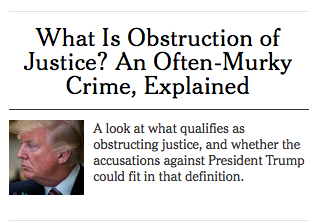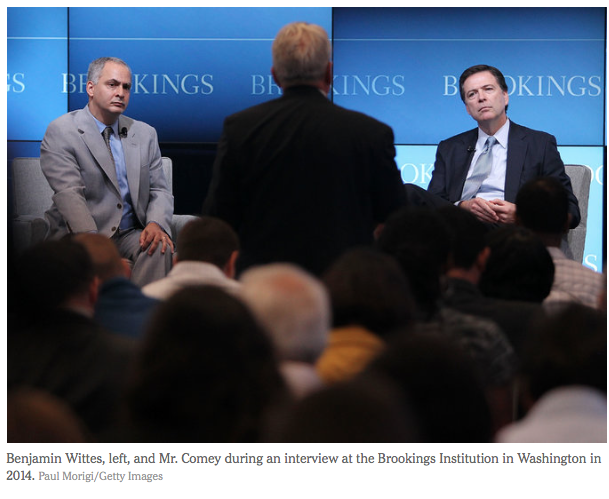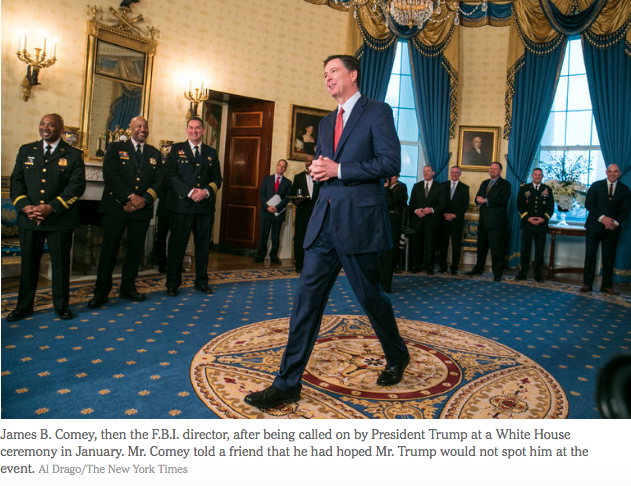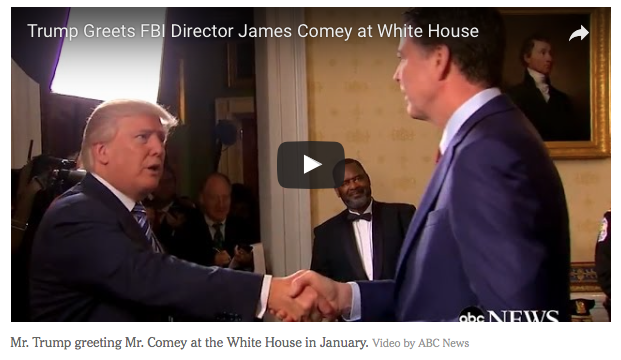WASHINGTON — President Trump called the F.B.I. director, James B. Comey, weeks after he took office and asked him when federal authorities were going to put out word that Mr. Trump was not personally under investigation, according to two people briefed on the call.
CLICK IMAGE ABOVE for direct link to NYT story.
Mr. Comey told the president that if he wanted to know details about the bureau’s investigations, he should not contact him directly but instead follow the proper procedures and have the White House counsel send any inquiries to the Justice Department, according to those people.
After explaining to Mr. Trump how communications with the F.B.I. should work, Mr. Comey believed he had effectively drawn the line after a series of encounters he had with the president and other White House officials that he felt jeopardized the F.B.I.’s independence. At the time, Mr. Comey was overseeing the investigation into links between Mr. Trump’s associates and Russia.
Those interactions included a dinner in which associates of Mr. Comey say Mr. Trump asked him to pledge his loyalty and a meeting in the Oval Office at which Mr. Trump told him he hoped Mr. Comey would shut down an investigation into Mr. Trump’s former national security adviser, Michael T. Flynn. Mr. Trump has denied making the request.
The day after the Flynn conversation, Reince Priebus, the White House chief of staff, asked Mr. Comey to help push back on reports in the news media that Mr. Trump’s associates had been in contact with Russian intelligence officials during the campaign. 
Mr. Comey described all of his contacts with the president and the White House — including the phone call from Mr. Trump — in detailed memos he wrote at the time and gave to his aides. Congressional investigators have requested copies of the memos, which, according to two people who have read them, provide snapshots of a fraught relationship between a president trying to win over and influence an F.B.I. director and someone who had built his reputation on asserting his independence, sometimes in a dramatic way.
Sean Spicer, the White House press secretary, said in a statement on Thursday that “the sworn testimony” of both Mr. Comey and Andrew G. McCabe, the F.B.I.’s acting director, “make clear that there was never any attempt to interfere in this investigation. As the president previously stated, he respects the ongoing investigations and will continue working to fulfill his promises to the American people.”
It is not clear whether in all their interactions Mr. Comey answered Mr. Trump’s question or if he ever told him whether he was under investigation. In the letter Mr. Trump sent to Mr. Comey last week in which he informed him that he had been fired, Mr. Trump told Mr. Comey, “I greatly appreciate you informing me, on three separate occasions, that I am not under investigation.”
The F.B.I.’s longest-serving director, J. Edgar Hoover, had close relationships with several presidents. But in the modern F.B.I., directors have sought an arm’s length relationship with the presidents they serve and have followed Justice Department guidelines outlining how the White House should have limited contact with the F.B.I.
Those guidelines, which also cover the F.B.I., prohibit conversations with the White House about active criminal investigations unless they are “important for the performance of the president’s duties and appropriate from a law enforcement perspective.” When such conversations are necessary, only the attorney general or the deputy attorney general can initiate those discussions.
Mr. Comey has spoken privately of his concerns that the contacts from Mr. Trump and his aides were inappropriate, and how he felt compelled to resist them. 
“He had to throw some brushback pitches to the administration,” Benjamin Wittes, a friend of Mr. Comey’s, said in interviews.
Mr. Wittes, a senior fellow at the Brookings Institution, the editor in chief of the Lawfare blog and a frequent critic of Mr. Trump, recalls a lunch he had with Mr. Comey in March at which Mr. Comey told him he had spent the first two months of Mr. Trump’s administration trying to preserve distance between the F.B.I. and the White House and educating it on the proper way to interact with the bureau.
Mr. Wittes said he never intended to publicly discuss his conversations with Mr. Comey. But after The New York Times reported earlier this month that shortly after his inauguration Mr. Trump asked Mr. Comey for a loyalty pledge, Mr. Wittes said he saw Mr. Trump’s behavior in a “more menacing light” and decided to speak out.




You must be logged in to post a comment Login